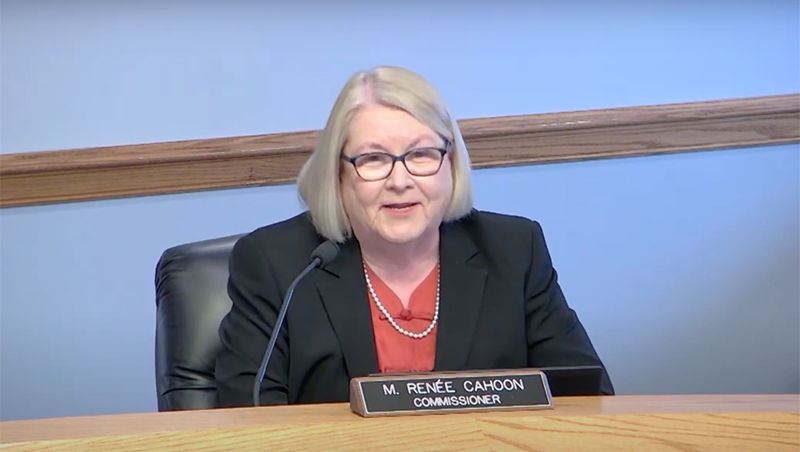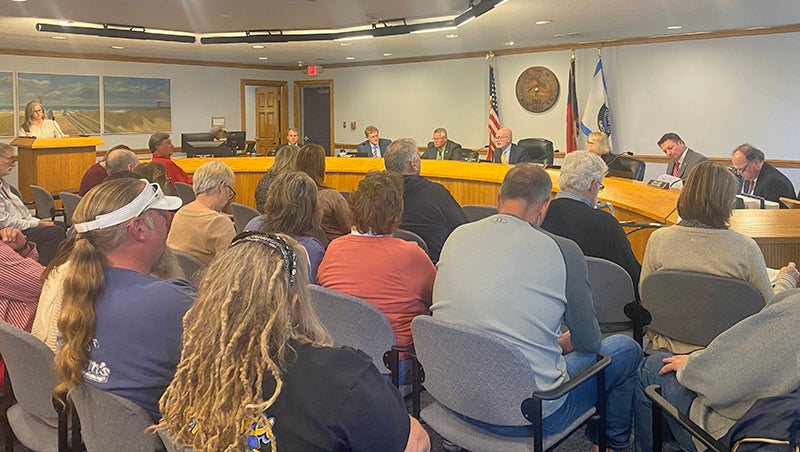Nags Head tables zoning decisions, leans toward protecting business owners in public hearing: ‘It’s not my desire to make it harder to do your business’
Published 10:28 am Wednesday, March 8, 2023
|
Getting your Trinity Audio player ready...
|
It was a packed house at the Nags Head commissioners meeting on Wednesday, March 1, with 25 people taking a turn at the podium to express their thoughts on the proposed rezoning between NC 12 and Hwy 158, from Danube Street to Hollowell Avenue, plus a section of S. Memorial Avenue in Old Nags Head Place.
Commissioners ultimately decided to table the issue until the March 15 regularly scheduled meeting, but they did approve several business-friendly motions directing the planning staff to make changes to the proposal.
The original recommendations from planning staff included rezoning a portion of C-2 to either R-3, High Density Residential (which is a bit of a misnomer; “high density” just means a slightly smaller lot but is limited to single family houses or duplexes), or the newly created C-5, Historic Character Commercial, which focuses on smaller scale businesses, selected uses or types of businesses, smaller lot coverage and single-family homes.
The proposed changes would have pushed about a dozen businesses or facilities into a nonconforming status – either a nonconforming “use” or type of business, or a nonconforming “structure,” meaning the size of the building is either larger than C-5 allows or doesn’t meet setback requirements or other regulations. Another handful of businesses would be allowed only by special use permit, which means additional oversight by the planning board and board of commissioners.
Former Nags Head mayor Bob Edwards opened public comment by offering some background information, explaining that this part of town has been zoned C-2 since 1969, and it was in 2015 that the town created the character areas.
“Character areas were not designed to have fences built around them, but were designed to reflect the character of an area that may have some pluses and minus to them, and some ins and outs. That was the original intent. I’m not sure how it has migrated to the point that we are talking about this morning,” Edwards said.
“Basically, what I’m asking this morning is, let’s slow down. We don’t have to approve this ordinance right away. Let’s make sure we do it right and do it right the first time,” he continued.
Kitty Hawk Kites owner John Harris spoke about the lack of security in the present ordinances that would allow nonconforming businesses to rebuild in the event of a fire or storm damage, and expressed concern about the additional oversight required by the town for businesses allowed by special use permit.
Donna Creef with Outer Banks Association of Realtors said “the proposed downzoning could negatively affect the values of vacant properties” and expressed concern about the viability of businesses with a nonconforming status.
“I own the property that is the elephant in the room,” said Elliot Katherman when he took his turn at the podium. Katherman purchased the 4.7-acre lot on Hollowell Avenue and Hwy 158 in 2000 as an investment.
“For 23 years I’ve been paying commercial rate taxes and decided when I retired in 2020 it was time to sell,” he said. Realtor Bobby Harrell said that last year alone Katherman paid over $14,000 in property taxes for that lot.
Katherman’s property was selected by Woda Cooper developers for essential and workforce housing, but when the town eliminated multi-family housing as an allowed use, the contract fell through.
In the proposed rezoning, Katherman’s property was recommended for R-3, residential.
“I’m expecting to be included in this new C-5. And instead, all of a sudden, I’ve been downgraded to R-3,” Katherman told commissioners. “This property has been commercial for decades and decades … I think that to me, for my property, it isn’t just rezoning, it’s essentially eminent domain – it’s gutting, it’s eviscerating the value of my property – taking it from the highest possible use to the lowest, without any compensation for that.”
Many other businesses owners including Surfside Plaza owner Cindy Brightbill, Sooey’s BBQ owner Beaman Hines and Brew Thru owner Philip Foreman (via letter) urged commissioners to reject the zoning amendments, or at least to slow down to allow time to fully understand the recommendations.
Part of the urgency initially was because of the mid-March expiration of the 150-day building moratorium set in place by commissioners on October 19. However, commissioners admitted that because the town already enacted new legislation prohibiting multi-family housing, there wasn’t as great a need to approve changes immediately to the Historic Character Area.
Not all speakers wished to tap the breaks. A dozen or more people were present or spoke in favor of the zoning changes. Resident Basil Belches led the charge requesting commissioners to approve the rezoning amendments to protect the charm and character of the neighborhood.
Many of those who wished to see the amendments passed as-is still expressed support for current Nags Head businesses, and recognized the fine line between protecting historic character and protecting good faith investments of local business owners.
The planning department came prepared to the meeting with changes to the amendments based on what they expected may be requested from commissioners to address many of these concerns.
“We tried to be prepared for the meeting,” said town manager Andy Garman to The Coastland Times March 2. “We had received numerous comments prior to the meeting and worked hard to anticipate some of the changes that the Board might request. We understood there was a desire to move forward with protecting this important area of the town while not harming any of the existing businesses that are integral to the fabric of our community.”
While the Unified Development Ordinance already included language that allowed a nonconforming structure to be rebuilt, commissioners requested that language be added to extend that to a nonconforming use as well.
The board also made further requests that the planning board rework the requirements for C-5 so that none of the current businesses would be made nonconforming by the changes.
“I support a lot of what staff and the planning board has done … what I cannot support is taking away someone’s commercial property,” commissioner Renee Cahoon said following the public comments.
“I have no desire to make a business nonconforming. I know what is like to deal with that. It is not as easy to deal with nonconforming property as people think. It’s really hard. It’s one of the things a bank asks you when you go to apply for a loan. Is your property nonconforming? And it makes a difference.”
“If they’re confirming now, I don’t want to see them made nonconforming. I still want you to stay, John. It’s not my desire to make it harder to do your business. Or you Cindy, either. I know your use now is permitted. I’d hate to see it not permitted,” she said to John Harris and Cindy Brightbill and other business owners in the room.
The other commissioners concurred.
Basically, the board directed planning staff to make changes to the proposal so that if a use was allowed in the C-2 district, it will be allowed in the C-5; if it was allowed by special use permit in C-2, it will be allowed by special use permit in C-5.
“Elimination of longstanding uses where property owners have reasonably expected them to remain in place – because uses have not been a problem – is really a draconian step and ought to be our last resort to resolve problems,” Mayor Ben Cahoon said.
Even though C-5 is being reworked to be more similar to the General Commercial C-2 district, planning director Kelly Wyatt said C-5 will still have fewer commercial uses allowed within it and generally those uses will be less intense.
Lot coverage, which is 55% in C-2 and was originally recommended for 40% in C-5, will now most likely be bumped up to 45%, and back up to 55% if a property owner uses permeable pavers.
Commissioners also seemed to agree that Katherman’s 4.7-acre lot on Hollowell Avenue should be zoned in the Historic Character Commercial C-5 district, not residential.
Though no specific mention was made of the other vacant lots along the highway that are recommended for residential zoning, Mayor Ben Cahoon commented that the properties fronting Hwy158 “should be the most intensely developed commercial uses.”
Agreeing with commissioner Kevin Brinkley, Cahoon said the bypass is not the best place for residential. “I personally would prefer an ordinance that leaves the existing uses in place,” Cahoon said.
“If not fronting 158, where’s a convenience store with gas supposed to go? Where is an indoor public assembly supposed to go? Where is a shopping center supposed to go? Where are townhouses, if you want them, supposed to go?” the mayor asked, stating that he would prefer an ordinance and a map that would permit those most intense uses to remain along Hwy 158, extending C-5 along the highway up to Hollowell Avenue.
The board will revisit the zoning amendments at the mid-March meeting, and will consider map amendments at the April 5 regularly scheduled meeting after the planning board reconvenes to make new recommendations.
SUBSCRIBE TO THE COASTLAND TIMES TODAY!








